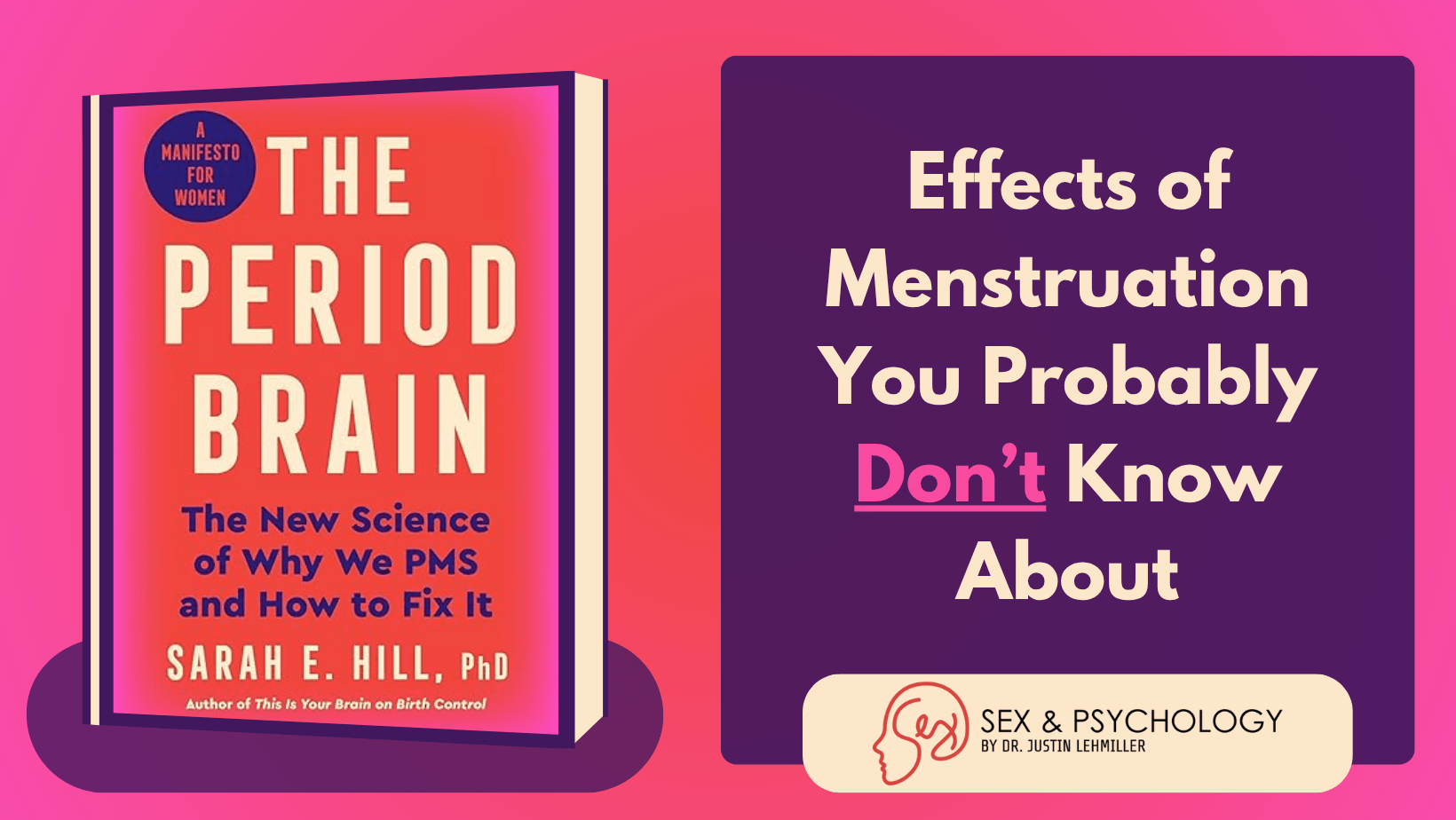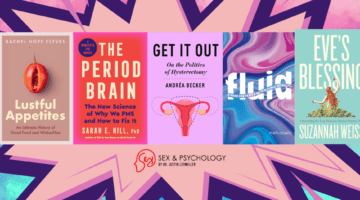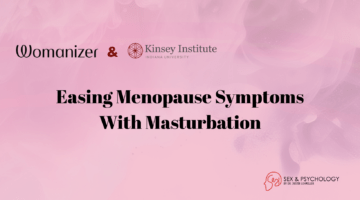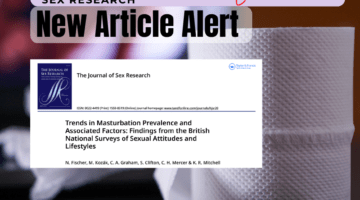Effects Of Menstruation You Probably Don’t Know About
October 29, 2025 by Emily Mendelson
Despite the fact that nearly half of the population worldwide will experience menstruation at least once in their lives, we know surprisingly little about what the effects of menstruation actually are. Even if we are fortunate to learn something about menstruation and periods in sex ed growing up (and many of us are not), most of the education people receive is either surface-level or simply inaccurate.
In this post, we’re going to discuss a book called The Period Brain: The New Science of Why We PMS and How To Fix It by Dr. Sarah Hill, who also wrote This is Your Brain on Birth Control. We’ll discuss some of the central themes this book covers, some information that I learned while reading that I found especially interesting, and what you can expect as a reader if you pick this book up yourself.
What are Periods, and Why Don’t We Know Much About Them?
The first section of The Period Brain covers some of the basic information we need to know if we are going to better understand the science behind periods and menstruation. Unfortunately, a lot of science has been ignoring women’s* health for so long that there are still a lot of answered questions about the female hormone cycle.
*We use “women” here and throughout the rest of the blog to refer to the realm of women’s health research that science about menstruation is most-commonly categorized as. However, we recognize that not all women menstruate for various reasons (e.g., due to menopause, health conditions, etc.), and not everyone who menstruates identifies as a woman.
For example, why does PMS make women feel so awful? Hill tells us that, intuitively, we would think that the symptoms of PMS would decrease as humans evolve and better adapt to their environment. The truth is, “because women’s bodies are designed to have two jobs in reproduction (sex and pregnancy), our sex hormones cycle.” In this way, women’s bodies are constantly moving between getting ready for pregnancy, and getting ready to have sex again to become pregnant. Here is where the case of symptom-laden PMS lies: because women’s bodies have gotten better at carrying children, PMS symptoms have become worse. Intense PMS symptoms are a signal that women’s bodies are actively preparing to bear children, and with this preparation comes a lot of side-effects that we may not necessarily realize are a response to the possibility of pregnancy in the first place.
The Hidden Hormone of Menstruation: Progesterone
When we say “PMS,” we are referring to premenstrual syndrome, which occurs a week or two before a period begins. What we are actually talking about when we refer to PMS is the luteal phase, which is the second-half of the menstrual cycle that lasts after ovulation ends until the period begins.
A hallmark of the luteal phase is the increased production of progesterone, which, as Hill says, “is at the heart of a lot of things we wrestle with as women.” The second section of The Period Brain is all about the effects of this increased progesterone production, which is a topic that has not had a lot of attention devoted to it—and if it did, we would likely know a ton more about the nuances of how women’s bodies change based on where they are in their menstrual cycle.
What we do know, according to Hill, is that (a) the increase in progesterone occurs because women’s bodies are using a ton more resources than normal to prepare for pregnancy, and (b) there are a number of biological realities associated with the increased progesterone production that might reveal a lot of what is still to be known about PMS and the luteal phase.
Two of the biological realities associated with increased progesterone that stood out to me are related to the idea that the body actually becomes weaker with more of this hormone. Specifically, women have decreased defenses to viruses during this phase, as well as changes in physical vulnerabilities depending on what stage of the menstrual cycle they’re in. During the luteal phase, joints and tendons are looser and it takes longer for injured tissue to heal. Additionally, progesterone exacerbates preexisting medical conditions, such as asthma, diabetes, anxiety, and a number of other common health conditions that are too many to list here.
Sidebar: ACL Tears in Women’s Sports. If you’ve followed the growth of women’s basketball in the past few years like I have, you’ve likely also noticed that ACL tears (and other knee-related injuries) feel far-too common. Superstars like JuJu Watkins, Cameron Brink, and Georgia Amoore were all sidelined in the past year or two due to ACL tears, and countless other women athletes have experienced them as well. As is turns out, this might have something to do with the risk of injury increasing based on whether someone is in the luteal phase or not, and research has recently begun to explore this topic more in-depth. If you’re interested in learning more, see [1], [2], and [3].
Further, much of what women have been told about being “too emotional” while in their luteal phase is also related to increased progesterone in the body. Those emotions? They actually reflect a higher threat sensitivity (such as to being abandoned or to being harmed) which is an adaptation to identify, avoid, and limit risks while pregnant.
Managing Your Menstrual Cycle
Thus far, we’ve discussed how there are biological reasons that women feel worse the two weeks leading up to their periods. However, this does not mean that it is “normal” to experience severe PMS symptoms. In fact, PMDD, or premenstrual dysphoric disorder, is “a mood disorder that is specific to the luteal phase.” Symptoms of PMDD can be severely distressing, and, at times, life-threatening. The Period Brain covers ways to identify when to see a physician about treating PMDD, as well as other methods to alleviate some of the distress associated with the luteal phase.
Overall, The Period Brain sheds light on the myriad ways progesterone affects women throughout the menstrual cycle, the majority of which we are never taught about. It is important to keep discussing menstruation, periods, and hormones openly and honestly so that women’s health can continue to gain the attention it needs.
If you want to hear from the author herself to learn more, we encourage you to check out this podcast episode with Dr. Hill about the book. You can also click here to order a copy of the book for yourself.
If you have a sex question of your own, record a voicemail at speakpipe.com/sexandpsychology to have it answered on the blog or the podcast.
Want to learn more about Sex and Psychology? Click here for more from the blog or here to listen to the podcast. Follow Sex and Psychology on Facebook, Twitter (@JustinLehmiller), Bluesky, or Reddit to receive updates. You can also follow Dr. Lehmiller on YouTube and Instagram.
Image made with Canva.

Dr. Justin Lehmiller
Founder & Owner of Sex and PsychologyDr. Justin Lehmiller is a social psychologist and Research Fellow at The Kinsey Institute. He runs the Sex and Psychology blog and podcast and is author of the popular book Tell Me What You Want. Dr. Lehmiller is an award-winning educator, and a prolific researcher who has published more than 50 academic works.
Read full bio >


